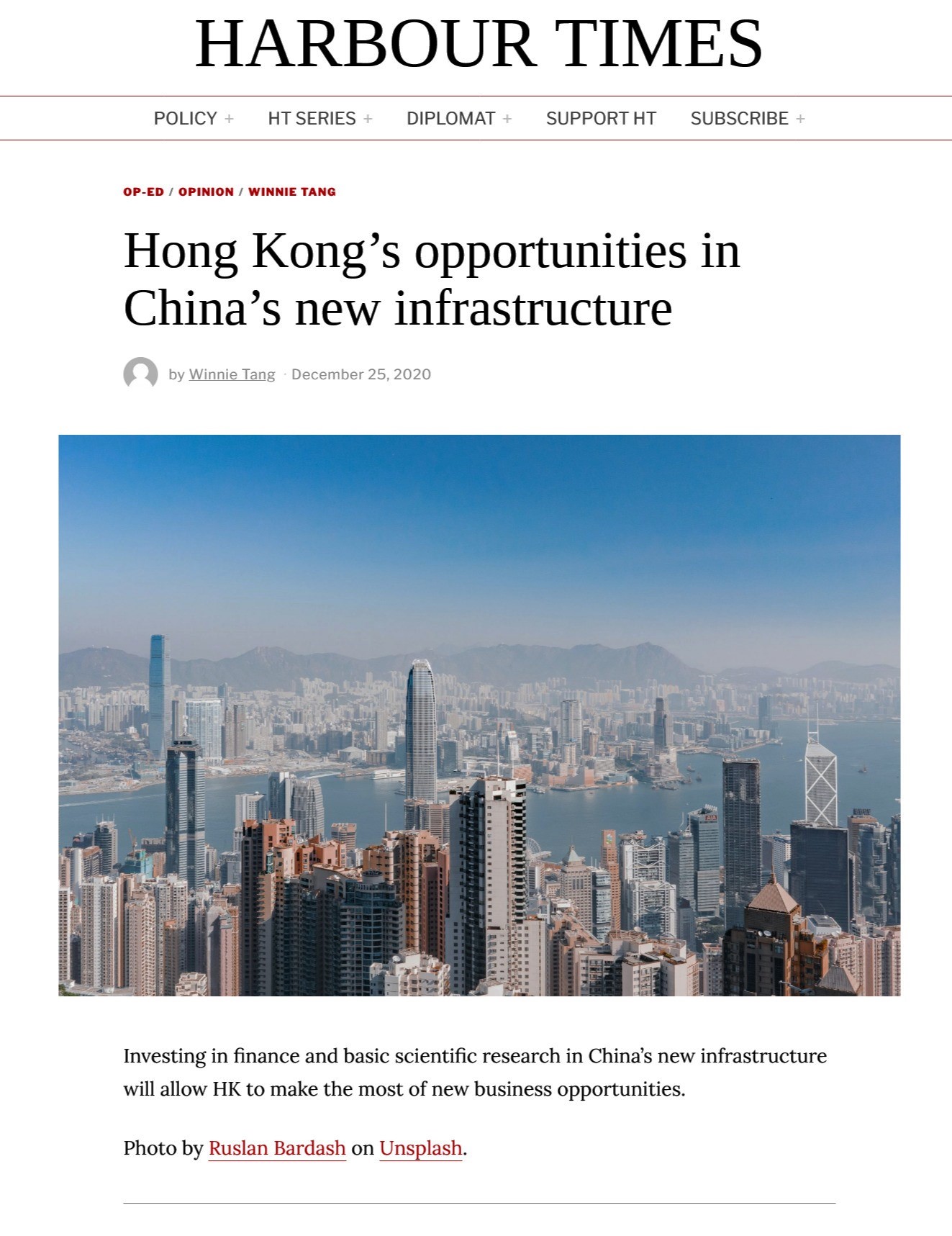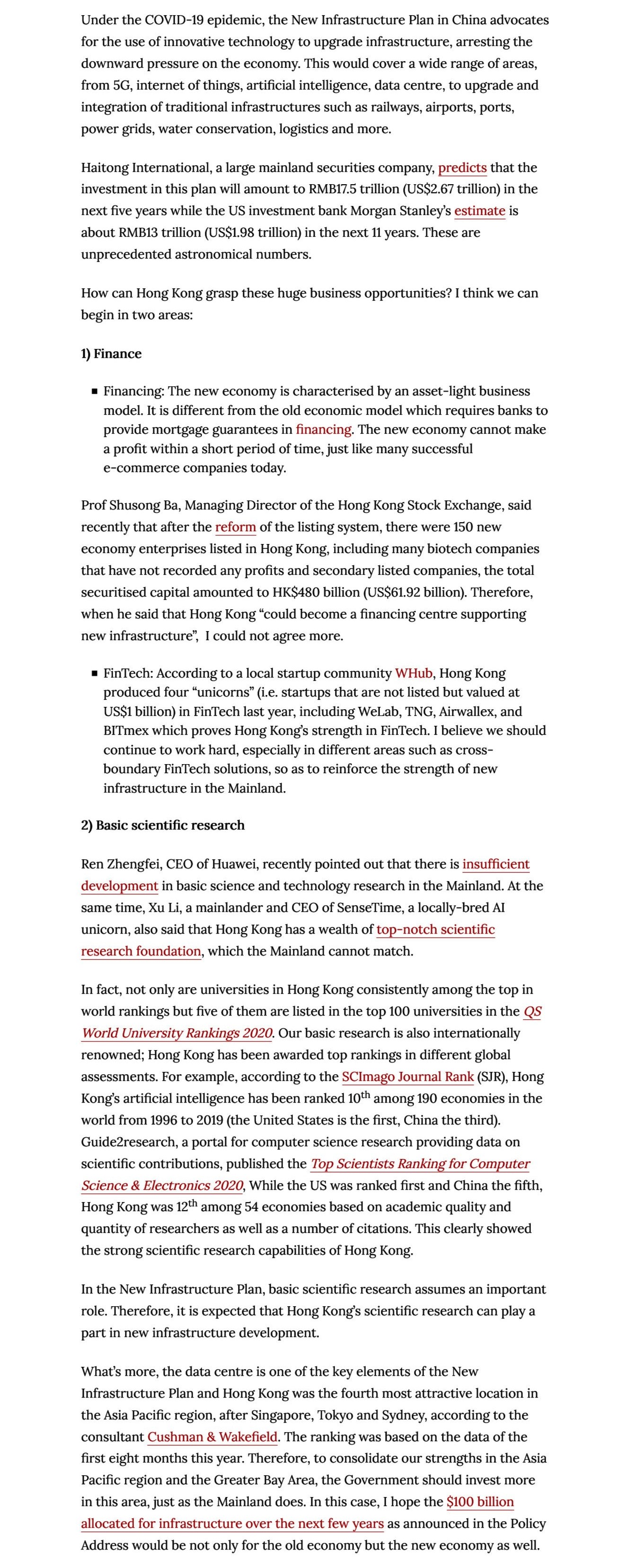網上版請按此


Hong Kong's opportunities in China's new infrastructure
Under the COVID-19 epidemic, the New Infrastructure Plan in China advocates for the use of innovative technology to upgrade infrastructure, arresting the downward pressure on the economy. This would cover a wide range of areas, from 5G, internet of things, artificial intelligence, data centre, to upgrade and integration of traditional infrastructures such as railways, airports, ports, power grids, water conservation, logistics and more.
Haitong International, a large mainland securities company, predicts that the investment in this plan will amount to RMB17.5 trillion (US$2.67 trillion) in the next five years while the US investment bank Morgan Stanley's estimate is about RMB13 trillion (US$1.98 trillion) in the next 11 years. These are unprecedented astronomical numbers.
How can Hong Kong grasp these huge business opportunities? I think we can begin in two areas:
1) Finance
Financing: The new economy is characterised by an asset-light business model. It is different from the old economic model which requires banks to provide mortgage guarantees in financing. The new economy cannot make a profit within a short period of time, just like many successful e-commerce companies today.
Prof Shusong Ba, Managing Director of the Hong Kong Stock Exchange, said recently that after the reform of the listing system, there were 150 new economy enterprises listed in Hong Kong, including many biotech companies that have not recorded any profits and secondary listed companies, the total securitised capital amounted to HK$480 billion (US$61.92 billion). Therefore, when he said that Hong Kong "could become a financing centre supporting new infrastructure", I could not agree more.
FinTech: According to a local startup community WHub, Hong Kong produced four "unicorns" (i.e. startups that are not listed but valued at US$1 billion) in FinTech last year, including WeLab, TNG, Airwallex, and BITmex which proves Hong Kong's strength in FinTech. I believe we should continue to work hard, especially in different areas such as cross-boundary FinTech solutions, so as to reinforce the strength of new infrastructure in the Mainland.
2) Basic scientific research
Ren Zhengfei, CEO of Huawei, recently pointed out that there is insufficient development in basic science and technology research in the Mainland. At the same time, Xu Li, a mainlander and CEO of SenseTime, a locally-bred AI unicorn, also said that Hong Kong has a wealth of top-notch scientific research foundation, which the Mainland cannot match.
In fact, not only are universities in Hong Kong consistently among the top in world rankings but five of them are listed in the top 100 universities in the QS World University Rankings 2020. Our basic research is also internationally renowned; Hong Kong has been awarded top rankings in different global assessments. For example, according to the SCImago Journal Rank (SJR), Hong Kong's artificial intelligence has been ranked 10th among 190 economies in the world from 1996 to 2019 (the United States is the first, China the third). Guide2research, a portal for computer science research providing data on scientific contributions, published the Top Scientists Ranking for Computer Science & Electronics 2020, While the US was ranked first and China the fifth, Hong Kong was 12th among 54 economies based on academic quality and quantity of researchers as well as a number of citations. This clearly showed the strong scientific research capabilities of Hong Kong.
In the New Infrastructure Plan, basic scientific research assumes an important role. Therefore, it is expected that Hong Kong's scientific research can play a part in new infrastructure development.
What's more, the data centre is one of the key elements of the New Infrastructure Plan and Hong Kong was the fourth most attractive location in the Asia Pacific region, after Singapore, Tokyo and Sydney, according to the consultant Cushman & Wakefield. The ranking was based on the data of the first eight months this year. Therefore, to consolidate our strengths in the Asia Pacific region and the Greater Bay Area, the Government should invest more in this area, just as the Mainland does. In this case, I hope the $100 billion allocated for infrastructure over the next few years as announced in the Policy Address would be not only for the old economy but the new economy as well.
Dr. Winnie Tang
Adjunct Professor, Department of Computer Science, Faculty of Engineering; Department of Geography, Faculty of Social Sciences; and Faculty of Architecture, The University of Hong Kong.